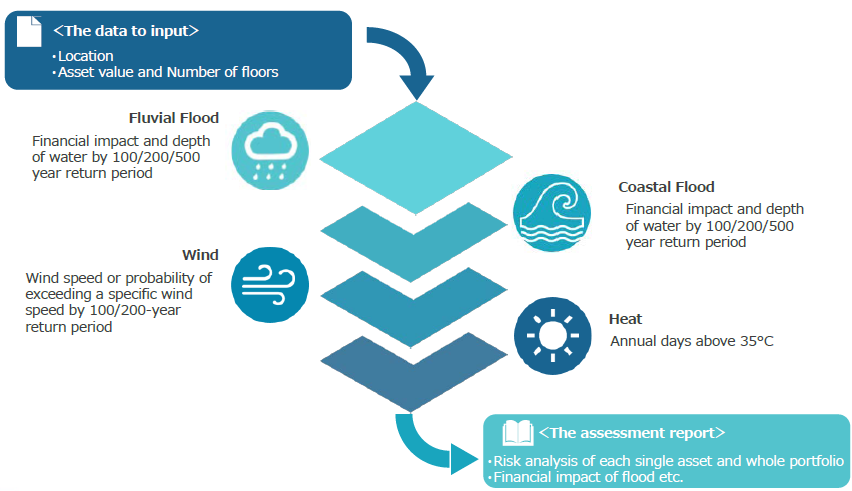

MS&AD Insurance Group Holdings Co., Ltd. (President and CEO: Noriyuki Hara) and MS&AD InterRisk Research & Consulting, Inc. (President: Terumi Nakamura, hereafter “InterRisk”), together with Jupiter Intelligence (CEO Rich Sorkin, hereafter "Jupiter") have started providing a service known as "Climate Change Impact Assessment Service for TCFD".
The MS&AD Group provides a financial support for Jupiter through its corporate venture capital, MS&AD Ventures since 2019. Jupiter has developed a next-generation climate risk analytics system for predicting multi-hazard risks such as floods and windstorms caused by climate change, with a 90m grid mapping which covers the whole world. InterRisk, which has a business expertise in climate change impact assessment, is now the first Japanese insurance/financial group able to provide a global climate change impact assessment through the partnership with Jupiter.
The MS&AD Group will promote to "identify and inform on risks" in the climate change area, as one of our most challenging global issues.
1. Outline of the Service
Using Jupiter's technology, we can accurately simulate various catastrophe indicators and financial impacts for different climate scenarios, time axes, and return periods based on data from the latitude and longitude of your business sites. Based on these outputs, we will support our clients to consider their financial disclosure following the requirements on the TCFD guideline.
<Specification>
■ Range and Accuracy: 90m mesh worldwide
■ Quantification of multi-hazards: inundation depth and maximum wind speed for catastrophes such as flooding, storm surges, windstorms and heat waves. Furthermore the financial impact caused by flooding and storm surge can be estimated.
■ Long time and short time axes: Output from 2020 to 2100 in 5 year increments

2. Background of business alliance and our new service
Frequent and intense extreme weather events have caused severe damages. As a result of further global warming in the future, physical risks of extreme weather events will increase. Since the risks impact not only individual corporate management strategy but also whole the financial system, the Task Force on Climate-related Financial Disclosures (TCFD) was established by the Financial Stability Board (FSB) and in 2017 released a report that recommends disclosure of the risks in financial reporting. Since then, many companies have been making efforts to assess and disclose climate-related risk information.
Jupiter’s technology, the industry’s first financial quantifiable analysis based on climate change, will enable us to calculate the effect of ‘multi-hazards’ e.g. flooding inundation depth for any location around the world. The analysis for each climate change scenario not only indicate the location by location result at the end of the 21st century, but will also display change with the lapse of time. The physical effect of such hazards is not the only information that companies should disclose. The impact on business activities needs to be taken into consideration and clearly disclosed to investors in a comprehensive way over a long-term timeframe.
The collaboration between Jupiter and InterRisk will be able to predict hazards across the world and formulate strategy planning and information disclosure based on these scientific analyses for our clients.
3. About Jupiter Intelligence
Jupiter is a leading provider of predictive data and analysis for climate risk. Its computing platform, specifically designed for climate impact analysis, provides the foundation for AI and scientific modeling fed by continuously refreshed satellite and sensor data. Jupiter’s team is comprised of global experts, e.g. a Nobel Prize winning expert in climate predictions (IPCC*) and the co-developer of the world-famous ocean weather analysis model (“Princeton Ocean Model”) which is used in 70 countries.
* The Intergovernmental Panel on Climate Change (IPCC) is the United Nations body for providing a comprehensive summary of what is known about the drivers of man-made climate change, its impacts and future risks, and how adaptation and mitigation can reduce those risks. IPCC was created in 1988 by the World Meteorological Organization (WMO) and the United Nations Environment Programme (UNEP). It was awarded the Nobel Peace Prize in 2007 for its work on climate change, together with former US Vice-‐President Al Gore.

